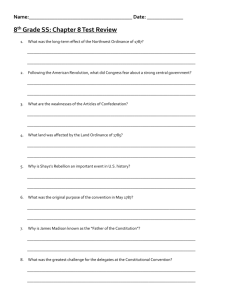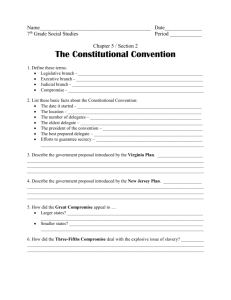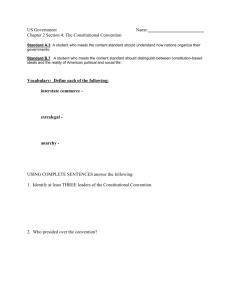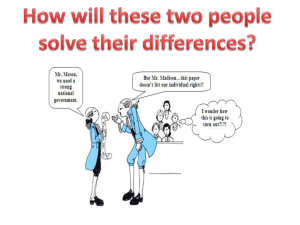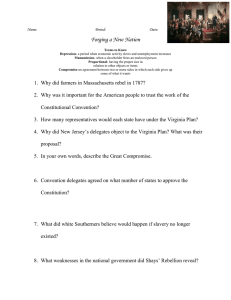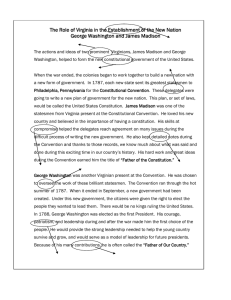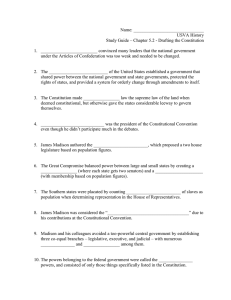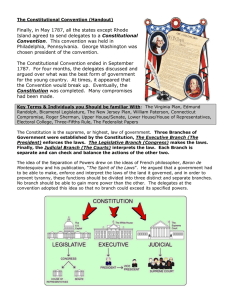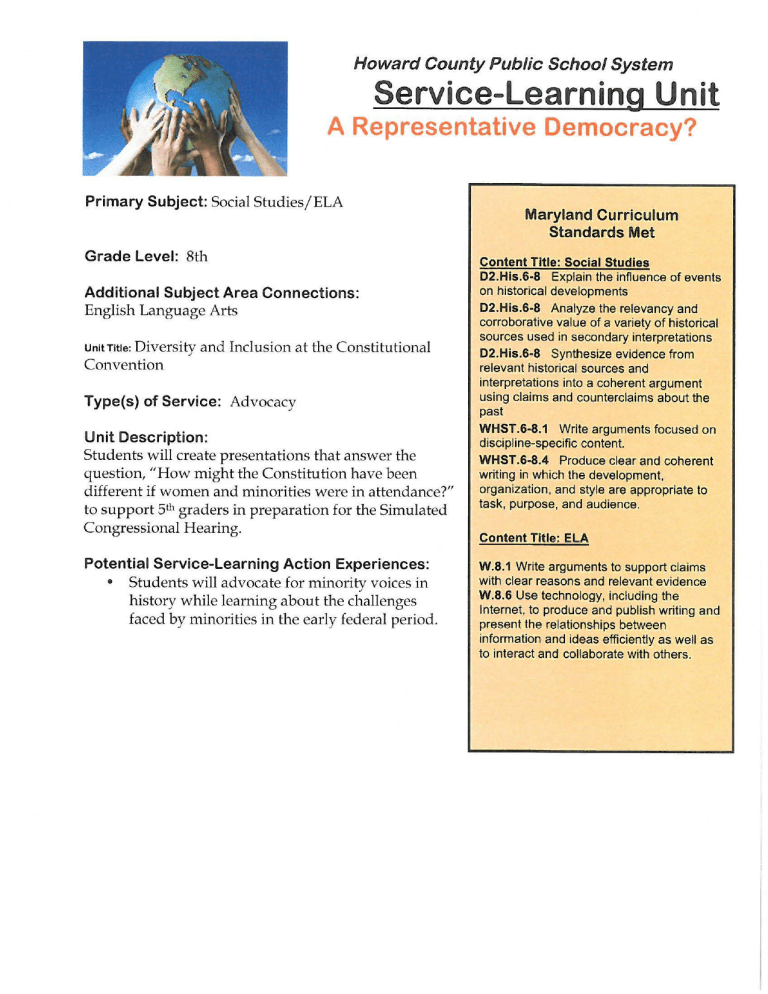
Howard County Public School System Service-Learning Unit A Representative Democracy? Primary Subjec t: Social Studi es/ELA Grade Level: 8th Addit ional Subject Area Connec tions: En glish Lan guage Arts Div ers ity and Inclu sion at th e Con stituti onal Conv enti on Unit Title : Type(s) of Service : Advoc acy Unit Description: Stud ents will create pr esent ations that answ er the qu es tion, "H ow might th e Constituti on have been diff erent if w om en and min or ities we re in att endan ce?" to supp ort 5th grad ers in pre para tion for the Simul ated Co ngr ess ional H earin g. Potential Service-Learn ing Action Experiences : • Stud ents w ill advoca te for mino rity voices in hi stor y w hil e learnin g abou t th e chall enges faced by minorities in th e ea rly federa l period. Mary land Curriculum Standards Met Content Title: Social Studies D2.His.6 -8 Explain the influence of events on historical developments D2.His.6-8 Analyze the relevancy and corroborative value of a variety of historical sources used in secondary interpretations D2.His.6-8 Synthesize evidence from relevant historical sources and interpretations into a coherent argument using claims and counterclaims about the past WHST.6-8.1 Write arguments focused on discipline-specific content. WHST .6-8.4 Produce clear and coherent writing in which the development , organ ization , and style are appropriate to task, purpose, and audience. Content Title : ELA W .8.1 Write arguments to support claims with clear reasons and relevant evidence W .8.6 Use technology, including the Internet , to produce and publish wr iting and present the relationships between information and ideas efficiently as well as to interact and collaborate with others . Alignment with Maryland's Best Practices of Service-Learning: A Representative Democrac y? 1. Meet a recognized community need Recently, students in HCPSS schools have identified a need to learn about diverse perspectives and voices in history . Furthermore, 5 th grade teachers and students have traditionally struggled to answer a Unit 2 question for the annual Simulated Congressional Hearings, "How might the Constitutional Convention have been different if women and minorities had been in attendance?" This SSL project meets both of these needs and asks students to take leadership in educating each other about minorities in US History. 2. Achieve curricular objectives through service-learning 8 th grade Social Studies - Identify and explain several key compromises that were made in the drafting of The Constitution. Explain the principles of government incorporated in the Constitution. 8 th grade English- What is the importance of freedom to the individual? Explain and apply elements of argument writing. Develop an understanding of freedom and its relationship to responsibility. 3. Reflect throughout the service-learning experience Much of this unit is based on research and reflection on research. However, upon completion of the unit students will be asked to write/ conduct a class discussion on the impact of hearing only one story. How did this impact our history? How did it limit freedom? What ramifications does this have for our society today? What are the connections between political voice and societal power? 4. Develop student responsibility (Students have opportunities to make decisions about the service-learning project.) Students will be asked to choose what minority group they would like to research. They will be responsible for dividing research and working collaboratively to create a project, and finally, they are ultimately responsible for the education of 5 th graders on topics that are crucial to an understanding of US History . 5. Establish community partnerships Teachers and SSL points of contact will be encouraged to reach out to the Howard County Public Library for support with research . They will also be encouraged to work with representatives from the Maryland Historical Society, the Howard County Historical Society, and the Maryland Humanities Council. 6. Plan ahead for service-learning Students will complete the "Framing the Inquiry" activity to determine who was at the Constitutional Convention, how minorities not represented at the Convention attempted to solicit impact, and to determine foundational goals from some minority groups . 7. Equip students with knowledge and skills needed for service In particular this SSL project supports civic education. Diversity and inclusion in history and curriculum have becom e controversial issues nationwide. This project asks students to develop civic knowledge around the foundations of the American political system and begins to challenge them on the role of citizens in American democracy. It challenges them to conduct research and create a project that advocates for the perspective of the oppressed and under heard. They are asked to evaluate the decisions made by the founders in regards to all the people living in the United States at the time of the Convention and it reinforces the civic disposition of respecting individual worth and human dignity while beginning to investigate how discrimination does not promote the health of a democracy through disenfranchising its people. Procedures with Resources: A Representative Democrac y? Theseproceduresrepresent an example of a service-learning lesson on this specific topic, but can be changedto meet individual classroominterests or vanJing community needs. You are encouragedto adapt this unit tofit your unique classroomand community and to solicit student input in planning and decision making. 1. Students will learn about the Constitutional Convention in their 8 th grade social studies classes. They will have a working knowledge of the compromises made through the debate and the final results of the convention and the Constitution. 2. Students will conduct the "Framing the Inquiry" portion of the Lesson in order to determine what minorities were not at the Convention, what issues they may have been concerned with and to create interest and motivation to complete research to answer the question: How might the Constitutional Convention have been different if women and minorities had been in attendance? 3. Students will choose a minority group to research. They will then research: a. What issues were faced by this group at the time of the Convention? b. What parts of the Constitution, if any, apply to the group and/ or issues being faced by the people? c. What solutions might this group have advocated to problems they were facing? d. How might they have brought these issues to the attention of the Framers if they were at the Constitutional Convention? e. How might the Constitution be different if this group was at the Constitutional Convention? 4. Students will create presentations that answer the questions above. Teachers will submit exemplary projects from their students to the offices of Elementary and Secondary Social Studies. Exemplary projects will be reviewed and provided to 5 th grade teachers for use with their classes as they prepare for the annual Simulated Congressional Hearings. Name: Date: ELA Teacher/Period: Soc St Teacher/Period: How would the Constitut ional Convention have been different if women, African Americans, and other minorities had been present? Directions: Read each of the following excerpts from a textbook and answer the guiding questions . As you read consider the following question: Who was at the Constitutional Convention? Document A: Excerpt We the People, The Citizen and the Constitution The delegates were not chosen from all parts of the American population. Some were rich, but most were not. There were no poor people , no indentured servants , or young people. All the Framers were men. Their average age was forty-two. There were no women among the delegates. There were no free black men or slaves. There were no American Indians. Poor farmers , such as those who took part in Shay's Rebellion - were not present, nor were the citizens of Rhode Island. People in Rhode Island were so much against changing the Articles of Confederation that they refused to send any delegate . We the People , The Citizen and the Constitution Grade 5 Text, p.65) "Fifty-five delegates attended the meeting that later became known as the Philadelphia or Constitutional Convention. This group of men are now often called the Framers of the Constitution . Most of the delegates were fairly young; the average age was 42. About three-fourths of them had served in Congress . Most were prominent in their states, and some had played important parts in the Revolution . Some were wealthy, but most were not. A French diplomat in America at the time said that the Framers were 'without being rich are all in easy circumstances." ... Max Farrand , a historian, wrote: " 'Great men there were , it is true , but the convention as a whole was composed of men such as would be appointed to a similar gathering at the present time: professional men, business men, and gentlemen of leisure ; patriotic statesmen and clever, scheming politicians; some trained by experience and study for the task before them; and others utterly unfit. It was essentially a representative body' " ( We the People, Grade 8 Text , p. 61 ). Guiding Questions: Close Reading : Who were the delegates to the Constitutional Convention? What type of people were they? Corroboration: Were the delegates to the Constitutional Convention representative of the people of the United States? Why or why not? Contextualization : What groups of people might feel they were not represented at the Convention? How might they have gone about addressing that issue? Directions : Read each of the following documents . As you read consider, how might the Constitutional Convention have been different if women, African Americans , and other minorities had been represented? Document 8 Source : http://mrnussbaum.com/history-2-2/congress/ Guiding Questions: Close Reading: Who is represented in this portrait? Contextualization: Who might these people be working to represent? Chronological Reasoning : What might be the outcome of a discussion led by these men for women? African Americans? Native Americans? Document C: Excerpt from Abigail Adams 's Letter to John Adams In a letter dated March 31, 1776, Abigail Adams writes to her husband, John Adams, urging him and the other members of the Continental Congress not to forget about the nation's women when fighting for America's independence from Great Britain. The future First Lady wrote in part, "I long to hear that you have declared an independency . And, by the way, in the new code of laws which I suppose it will be necessary for you to make, I desire you would remember the ladies and be more generous and favorable to them than your ancestors. Do not put such unlimited power into the hands of the husbands . Remember, all men wou ld be tyrants if they could. If particular care and attention is not paid to the ladies , we are determ ined to foment a rebellion, and will not hold ourselves bound by any laws in which we have no voice or representation ." http://www.history .com/this-day-in-history/abigail-adams-urges-husband-to-rememberthe -ladies Guiding Questions: Sourcing: Who wrote this letter and to whom was it written? Sourcing: Why do you think this person wrote this letter? Close Reading : What minority group is the author representing? Close Reading : What claim does the author make about "all men?" Do you agree or disagree? Why? Close Reading: What response does this person claim will occur if her ideas are ignored? Why do you think she felt that way? Document D: Benjamin Banneker 's Letter to Thomas Jefferson, 1791 http://www .pbs.org/wgbh/aia/part2/2h71t.h tml Benjamin Banneker was an astronomer and surveyor who laid out the original borders for Washington , D.C. The son of a free African American and a former slave, Banneker enclosed this letter to Thomas Jefferson , along with an almanac for the coming year , which Banneker had compiled . In his letter, Banneker opens with the following plea: "I apprehend you will embrace every opportunity , to eradicate that train of absurd and false ideas and opinions, which so generally prevails with respect to [African Americans] . .. that however variable we may be in society or religion, however diversified in situation or color, we are all of the same family , and stand in the same relatio n to [God]. " Banneker reminds Jefferson of how, just 15 years prior , "the arms and tyranny of the British crown " had transformed the colonists into servants of the king. He goes on to state : "This, Sir, was a time when you clearly saw into t he injustice of a state of slavery , and in which you had just apprehensions of the horrors of its condition . It was now that your [horror of slavery] was so excited , that you publicly held forth this true and invaluable doctrine , which is worthy to be recorded and remembered in all succeedi ng ages : 'We hold these trut hs to be self-evident , that all men are created equal; that they are endowed by their Creator with certain unalienable rights, and that among these are, life, liberty , and the pursuit of happiness .'...but, Sir, how pitiable is it to reflect , that alt hough you we re so fu lly convinced of the benevolence* of the Father of Mankind, and of his equal and impartial d istribution of these rights and privileges, which he hath conferred upon them, that you should at t he same time counteract* his mercies, in detain ing by f raud and violence so numerous a part of my [brothers ], under groaning captivity and cruel oppression , that you should at the same time be found guilty of that most criminal act, which you professedly detested in others, with respect to yourselves ." *benevolence: kindness and generosity *counteract: put a stop to or cance l out Guiding Questions: Sourcing : Who wrote this document? Who was he writing to? Sourcing : What group of people was this author trying to represent? Critical Reading : What did the author desire of the Constitutional Convention? Contextualization : How did the Constitutional Convention address this author's primary goal? What compromise was established? Claim: Do you think the Constitutional Convention was representative of the people this author was speaking for? Why or why not? Document E: Excerpt from thisnation.com , discussing the representation and demographics of the 112th Congress . Decisions in Congress are made collectively , but representation occurs primarily at the level of the individual member . While some people believe that a representative should , at the individua l level , share important physical characteristics with the people he or she represents , others hold that "descriptive" or "demographic" representation is much less than "substantive" representation. From this perspec t ive, a white woman cou ld represent a black man or a Hispanic man cou ld represent a black woman if the foc us was promot ing the interests of the represen ted individua l or individua ls. Indeed, James Madison observed in The Federalist No. 10 that the true test of a representative is his or her ability to make difficult decisions that promote the long-term best interests of the people back home . A representative government, he wrote , ought to : . .. refine and enlarge the public views by passing them through the medium of a chosen body of citizens whose wisdom may best discern the true interest of their country and whose patriotism and love of justice will be least likely to sacrifice it to temporary or partial considerations. Under such a regulation it may well happen that the public voice , pronounced by the representatives of the people, will be more consonant to the public good than if pronounced by the people themselves , convened for the same purpose . It is likely that Madison would have thought any discussion of the demographic dimensions of representation irrelevant.. . http ://thisnation.com/congress -facts .html Guiding Questio ns: Close Reading: What does James Madison claim will best benefit the "public good? " Do you agree or disagree? Why? Synthesis : According to this website , Congress still does not demographically reflect the United States, most Congress people are still wealthy white men, do you think that impacts the way they vote? Why or why not? Can you think of any evidence from the present to support your answer? Reflection: Directions: Based on the documents you have read answer the following question with your own ideas citing evidence from the texts to support your thesis . Do you think the Constitutiona l Convention was representative of the United States at the time? Why or why not? YOUR TASK ... Background: Do you remember much about 5th grade? Do you remember participating in the Simulated Congressional Hearings? Do you remember all of the research and work you did to prepare for that one day??? Your job for the rest of this lesson is to help 5th graders prepare for their Simulated Congressional Hearings. Every year, all 5th graders in Howard County Public Schools participate in SCH. Each year students research all sorts of topics relating to the Constitution, citizens' rights and responsibilities, and how the government of the United States works. Each year students struggle with one question in particular: How might the Constitution be different if women, African Americans, and other minorities have been represented? Your job is to conduct research and create a presentation in order to help 5th grade students in Howard County have more information to answer that question. Your research should be extensive and your presentation should be clear and informative and should answer the following questions: 1. What issues were faced by this group at the time of the Convention? 2. What parts of the Constitution , if any, apply to the group and/or issues being faced by the people? 3. What solutions might this group have advocated to problems they were facing? 4. How might they have brought these issues to the attention of the Framers if they were at the Constitutional Convention? 5. How might the Constitution be different if this group was at the Constitutional Convention? Your presentation may take any of the following formats: • • • • • Powerpoint Movie Speech Essay Website
